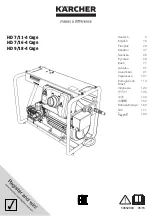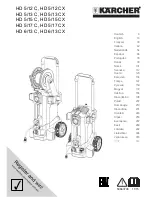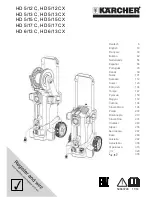
5
EN
order of removal procedure; see, "Removing the
transportation locks".
C
Never move the product without the
transportation safety bolts properly fixed in
place!
Disposing of the old product
Dispose of the old product in an environmentally
friendly manner.
Refer to your local dealer or solid waste collection
centre in your area to learn how to dispose of your
product.
For children's safety, cut the power cable and break
the locking mechanism of the loading door so that it
will be nonfunctional before disposing of the product.
them separately.
•
Tough stains must be treated properly before
washing. If unsure, check with a dry cleaner.
•
Use only dyes/colour changers and limescale
removers suitable for machine wash. Always
follow the instructions on the package.
•
Wash trousers and delicate laundry turned inside
out.
•
Keep laundry items made of Angora wool in the
freezer for a few hours before washing. This will
reduce pilling.
•
Laundry that are subjected to materials such as
flour, lime dust, milk powder, etc. intensely must
be shaken off before placing into the machine.
Such dusts and powders on the laundry may
build up on the inner parts of the machine in
time and can cause damage.
Correct load capacity
The maximum load capacity depends on the type
of laundry, the degree of soiling and the washing
programme desired.
The machine automatically adjusts the amount of
water according to the weight of the loaded laundry.
A
Follow the information in the “Programme
and consumption table”. When overloaded,
machine's washing performance will drop.
Moreover, noise and vibration problems may
occur.
Loading the laundry
•
Open the loading door.
•
Place laundry items loosely into the machine.
•
Push the loading door to close until you hear a
locking sound. Ensure that no items are caught
in the door.
C
The loading door is locked while a programme
is running. The door can only be opened a while
after the programme comes to an end.
A
In case of misplacing the laundry, noise and
vibration problems may occur in the machine.
Using detergent and softener
Detergent Drawer
The detergent drawer is composed of three
compartments:
- (1) for prewash
- (2) for main wash
– (3) for softener
– (*) in addition, there is siphon piece in the softener
compartment.
1
2 3
C
The detergent dispenser may be in two different
types according to the model of your machine
as seen above.
Detergent, softener and other cleaning agents
•
Add detergent and softener before starting the
washing programme.
3 Preparation
Things to be done for energy saving
Following information will help you use the product in
an ecological and energy-efficient manner.
•
Operate the product in the highest capacity
allowed by the programme you have selected,
but do not overload; see, "Programme and
consumption table".
•
Always follow the instructions on the detergent
packaging.
•
Wash slightly soiled laundry at low temperatures.
•
Use faster programmes for small quantities of
lightly soiled laundry.
•
Do not use prewash and high temperatures for
laundry that is not heavily soiled or stained.
•
If you plan to dry your laundry in a dryer, select
the highest spin speed recommended during
washing process.
•
Do not use detergent in excess of the amount
recommended on the detergent package.
Sorting the laundry
•
Sort laundry according to type of fabric, colour,
and degree of soiling and allowable water
temperature.
•
Always obey the instructions given on the
garment tags.
Preparing laundry for washing
•
Laundry items with metal attachments such as,
underwired bras, belt buckles or metal buttons
will damage the machine. Remove the metal
pieces or wash the clothes by putting them in a
laundry bag or pillow case.
• Take out all substances in the pockets such as
coins, pens and paper clips, and turn pockets
inside out and brush. Such objects may
damage the product or cause noise problem.
•
Put small size clothes such as infant's socks
and nylon stockings in a laundry bag or pillow
case.
•
Place curtains in without compressing them.
Remove curtain attachment items.
•
Fasten zippers, sew loose buttons and mend
rips and tears.
•
Wash “machine washable” or “hand washable”
labeled products only with an appropriate
programme.
•
Do not wash colours and whites together. New,
dark coloured cottons release a lot of dye. Wash
Summary of Contents for WMB 71041
Page 1: ...Washing Machine Lave linge WMB 71041 WMB 71241 WMB 71241 S ...
Page 19: ......
Page 39: ...39 FR ...
Page 40: ...40 FR ...






































